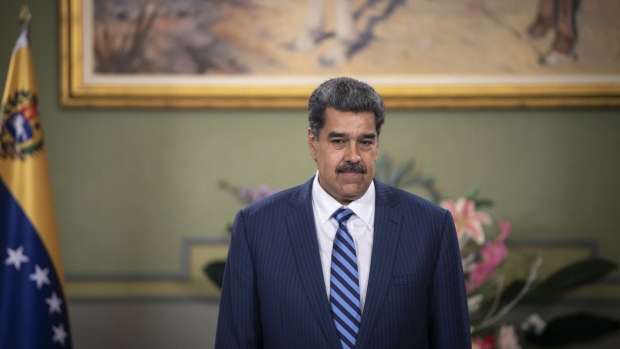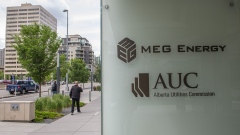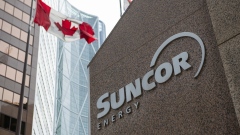Sep 7, 2023
Venezuela’s Maduro Visits China for Economic Help Before Vote
, Bloomberg News

(Bloomberg) -- Venezuela’s Nicolás Maduro arrived in China on Friday as he tries to secure financial support from President Xi Jinping’s government before a presidential election.
Maduro will pay a state visit from Sept. 8-14, China’s Foreign Ministry said in a statement. His visit comes as Xi skips the Group of Twenty leaders’ summit in India this weekend for the first time since coming to power.
A meeting between Maduro and Xi would represent their first sit down in five years.
“Here we are in China again,” Maduro said in a video posted on X, the platform formerly known as Twitter, as he arrived in Shenzhen for what he called a “historical visit.”
Venezuela and China are re-establishing connections after years of cooling ties, and against a backdrop of intensifying Washington-Beijing rivalry. President Joe Biden is also seeking to engage Venezuelan officials in talks to lift sanctions in exchange for allowing fair elections next year.
A delegation from Venezuela, led by Vice President Delcy Rodriguez and Oil Minister Pedro Tellechea, arrived in Shanghai early this week, the most senior group from the country to visit China in five years. The pair are discussing potential joint ventures between China and state-run Petroleos de Venezuela SA, according to two people with direct knowledge of the matter.
The delegation has met with Chinese Foreign Minister Wang Yi and Dilma Rousseff, president of the New Development Bank, headquartered in Shanghai and launched by BRICS members. They have also visited Shanghai’s Oil and Gas Exchange.
Maduro’s government is seeking to raise more money from Venezuela’s massive oil wealth before his expected bid for a third presidential term. Venezuela has the world’s largest crude reserves, and oil accounts for about 95% of its overseas revenue. Those cash inflows have been hit in recent years by mismanagement, corruption and US sanctions.
Venezuela’s oil ministry has been working closely with China National Petroleum Corp. officials on a renewed conduit that would cut out middlemen and allow them to ship crude directly, Tellechea said in May. CNPC is currently producing 80,000 barrels a day, half of what it used to pump in 2015, according to data compiled by Bloomberg.
China became a key lender to Venezuela in 2007, when it first provided funds for infrastructure and oil projects under late President Hugo Chávez. Public data indicate that Beijing lent upwards of $60 billion in oil-backed loans through state-run banks through 2015, reaching a level of diplomatic and financial investment unmatched elsewhere in Latin America.
--With assistance from Fran Wang and Colum Murphy.
(Adds details of Maduro’s arrival in first and fourth paragraphs.)
©2023 Bloomberg L.P.








